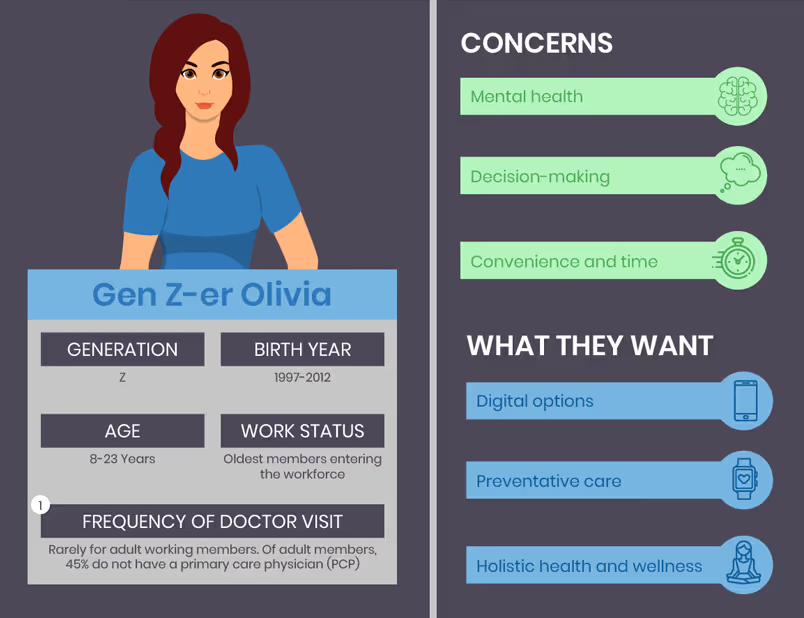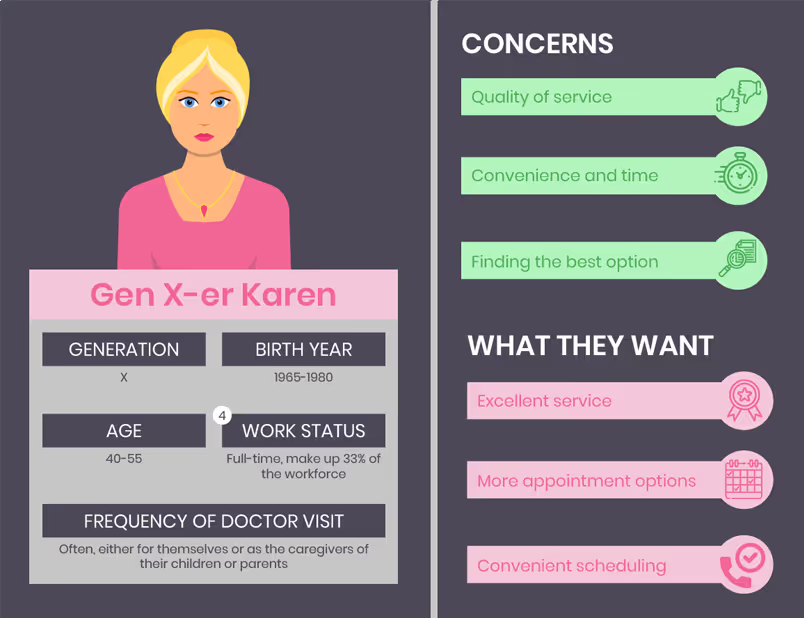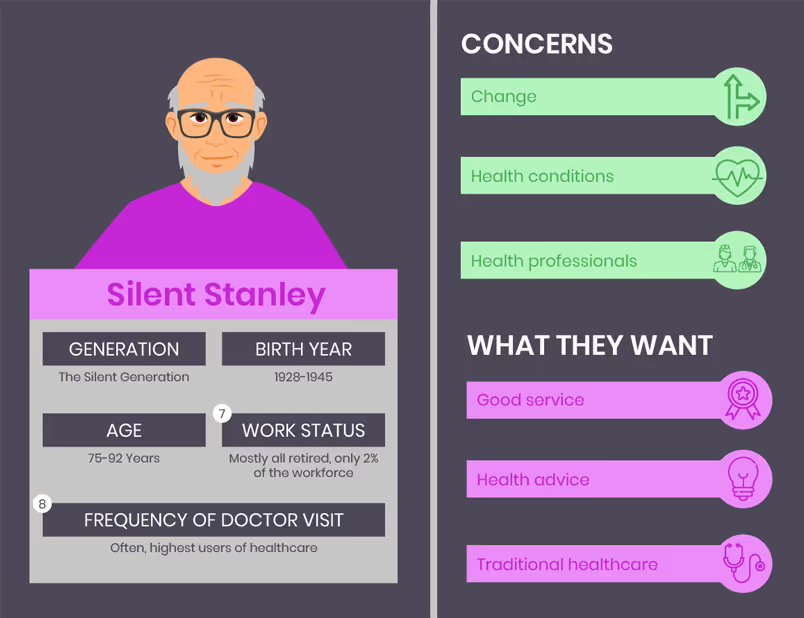What Different Generations Want in Healthcare
Giving the same patient experience across the board no longer works. As this industry changes, practices need to make sure they understand what different generations want in healthcare.

Different generations want different experiences in healthcare. While the healthcare industry has seen so many changes over the past decade due to technology, it has also started to focus more on patient outcomes.
Trends like telemedicine, price transparency, remote monitoring tools and artificial intelligence are all fueled by younger patient generations.
These cohorts grew up with the internet and can’t live without their smart devices. They want fast-paced care and digital health options that reflect their lifestyle. The more time they save and the easier they can access their data, the better.
Giving the same patient experience across the board no longer works. As this industry changes, practices need to make sure they understand what different generations want in healthcare.
Generation Z
Generation Z has yet to have a definitive age range but usually refers to those born between 1997 and 2012. They’re defined as those who’ve grown up with the internet and social media. But for the sake of this blog post, we’ll focus on the adults of this generation since those born less than a decade ago aren’t making decisions about their healthcare.
This age group’s oldest members are now independent and entering the workforce. They’re considered “digital natives” and practically live on their phones. Because of this, they want similar experiences with their healthcare. This includes…
- Telemedicine
- Online payment and scheduling
- Wearable devices
- Easy access to their health data
These options increase convenience for them, which is beneficial to their busy and fast-paced lives.

Almost half of the adults within this cohort don’t have a primary care physician (PCP). That’s likely the result of their views on healthcare. Generation Z patients are less likely to go to the doctor because of the cost, the inconvenience of coming in, and their general lack of time.
But they still prioritize both their physical and mental health. They’re more likely to rank their mental health as poor, and many have concerns with their stress levels.
They’re more aware of whole-person wellness and tend to seek out care alternatives, such as supplements and wearable devices. Because of the digital options already available, this group is likely to take preventative care into their own hands.
Generation Z patients don’t want an “old school” model of healthcare where they have no input in decision-making. They choose providers based on digital offerings. But they’ll still consult their parents when making healthcare decisions since they’re just now becoming independent.
Generation Y (Millennials)
Like Generation Z, Millennials want digital options for convenience in their fast-paced lifestyles. They want the option to access medical records and schedule appointments online. They also want the option to chat with medical professionals on social media since they’re too busy to visit the doctor. This generation has the lowest users of traditional healthcare in today’s workforce.
Millennials tend to make decisions based on emotional experiences. Only one negative experience can cause them to switch providers.

They place a high value on their peers’ input and existing patient testimonials. So much so that they’re more likely to make decisions based on advice they hear and read than expert advice. But they still want informational materials with comparison tools to help them make decisions.
This generation also focuses on the cost of healthcare when making choices. They desire price transparency, a variety of price options, and want plans with high deductibles with lower premiums.
Generation X (Latch Key)
Generation X makes their healthcare decisions like they make retail decisions. They search for and rely on various sources of information, analyzing all options to determine which is best. They have an active, selective attitude when making decisions.
This cohort often visits the doctor, but not only for themselves. As caregivers for both their children and their aging parents, Generation X-ers will make frequent trips to the doctor.

Since many of them work full-time, with 33% making up the workforce, they need convenience and ease when scheduling appointments. Because of this, they want more appointment time options such as after-work hours and on weekends.
Baby Boomers (The "Me" Generation)
This aging generation relies on healthcare often for their existing and developing conditions.
Baby Boomers are more brand-faithful than younger age groups and they’ll return to a practice if it has quality care and coverage. But they also make some decisions based on word-of-mouth recommendations and online ratings.

They value practices with high reputations because they want a doctor they can trust. Baby Boomers follow and rely on physician advice and care more than any later generation. So they’ll often choose a practice with a name that they recognize and trust.
The Silent Generation
This generation is like Baby Boomers in that they rely on doctors’ advice. They’re the most likely generation to follow doctors’ orders. They respect their medical professional’s authority and they have a firm belief in good service. Because of this, they want credible professionals; they won’t trust just any health expert.

The Silent Generation has static views and is less likely to change their views than any other group. They like to stick to traditional health advice, which is why they aren’t as comfortable with the current shift in the health industry.
Conclusion
Healthcare is changing rapidly as younger generations head into the workforce. The industry is trying to keep up with this new, fast-paced world.
But practices can’t forget about the older demographics who rely on traditional healthcare the most. Organizations must consider all patient generations as they make changes to keep up with younger demographics.
Understanding what different generations want in healthcare and how they make their decisions is essential to stay relevant within this industry.
Resources
- 45% of Generation Z does not have a primary care physician - Advisory Board
- Of the current workforce, Millennials make up 35%, Generation X makes up 33%, Baby Boomers make up 25%, and The Silent Generation makes up 2% - Harvard Pilgrim Health Care
- Millennials are the lowest users of traditional healthcare with 51% visiting a doctor less than once a year - Zocdoc
- Baby Boomers and members The Silent Generation are the highest users of healthcare - Harvard Pilgrim Health Care
Emphasize your product's unique features or benefits to differentiate it from competitors
In nec dictum adipiscing pharetra enim etiam scelerisque dolor purus ipsum egestas cursus vulputate arcu egestas ut eu sed mollis consectetur mattis pharetra curabitur et maecenas in mattis fames consectetur ipsum quis risus mauris aliquam ornare nisl purus at ipsum nulla accumsan consectetur vestibulum suspendisse aliquam condimentum scelerisque lacinia pellentesque vestibulum condimentum turpis ligula pharetra dictum sapien facilisis sapien at sagittis et cursus congue.
- Pharetra curabitur et maecenas in mattis fames consectetur ipsum quis risus.
- Justo urna nisi auctor consequat consectetur dolor lectus blandit.
- Eget egestas volutpat lacinia vestibulum vitae mattis hendrerit.
- Ornare elit odio tellus orci bibendum dictum id sem congue enim amet diam.
Incorporate statistics or specific numbers to highlight the effectiveness or popularity of your offering
Convallis pellentesque ullamcorper sapien sed tristique fermentum proin amet quam tincidunt feugiat vitae neque quisque odio ut pellentesque ac mauris eget lectus. Pretium arcu turpis lacus sapien sit at eu sapien duis magna nunc nibh nam non ut nibh ultrices ultrices elementum egestas enim nisl sed cursus pellentesque sit dignissim enim euismod sit et convallis sed pelis viverra quam at nisl sit pharetra enim nisl nec vestibulum posuere in volutpat sed blandit neque risus.

Use time-sensitive language to encourage immediate action, such as "Limited Time Offer
Feugiat vitae neque quisque odio ut pellentesque ac mauris eget lectus. Pretium arcu turpis lacus sapien sit at eu sapien duis magna nunc nibh nam non ut nibh ultrices ultrices elementum egestas enim nisl sed cursus pellentesque sit dignissim enim euismod sit et convallis sed pelis viverra quam at nisl sit pharetra enim nisl nec vestibulum posuere in volutpat sed blandit neque risus.
- Pharetra curabitur et maecenas in mattis fames consectetur ipsum quis risus.
- Justo urna nisi auctor consequat consectetur dolor lectus blandit.
- Eget egestas volutpat lacinia vestibulum vitae mattis hendrerit.
- Ornare elit odio tellus orci bibendum dictum id sem congue enim amet diam.
Address customer pain points directly by showing how your product solves their problems
Feugiat vitae neque quisque odio ut pellentesque ac mauris eget lectus. Pretium arcu turpis lacus sapien sit at eu sapien duis magna nunc nibh nam non ut nibh ultrices ultrices elementum egestas enim nisl sed cursus pellentesque sit dignissim enim euismod sit et convallis sed pelis viverra quam at nisl sit pharetra enim nisl nec vestibulum posuere in volutpat sed blandit neque risus.
Vel etiam vel amet aenean eget in habitasse nunc duis tellus sem turpis risus aliquam ac volutpat tellus eu faucibus ullamcorper.
Tailor titles to your ideal customer segment using phrases like "Designed for Busy Professionals
Sed pretium id nibh id sit felis vitae volutpat volutpat adipiscing at sodales neque lectus mi phasellus commodo at elit suspendisse ornare faucibus lectus purus viverra in nec aliquet commodo et sed sed nisi tempor mi pellentesque arcu viverra pretium duis enim vulputate dignissim etiam ultrices vitae neque urna proin nibh diam turpis augue lacus.


.avif)

